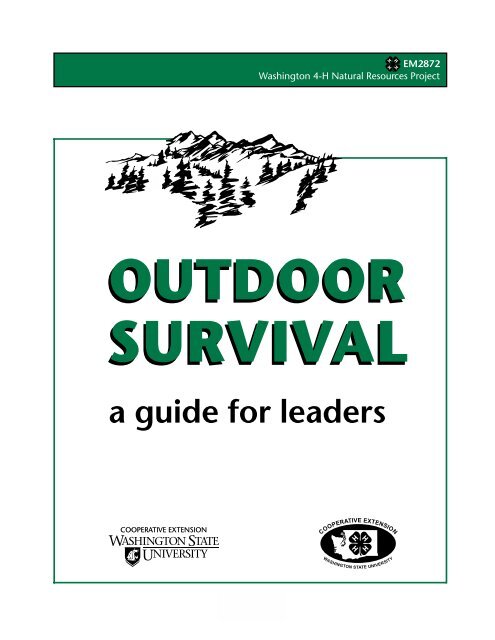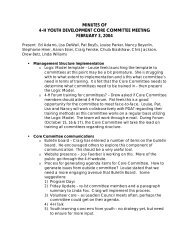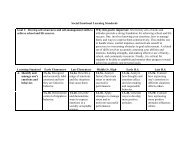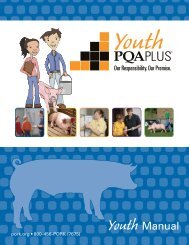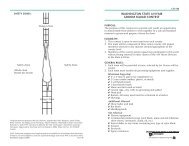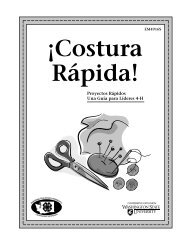outdoor survival - 4-H Youth Development Program - Washington ...
outdoor survival - 4-H Youth Development Program - Washington ...
outdoor survival - 4-H Youth Development Program - Washington ...
You also want an ePaper? Increase the reach of your titles
YUMPU automatically turns print PDFs into web optimized ePapers that Google loves.
OUTDOOR<br />
SURVIVAL<br />
a guide for leaders<br />
COOPERATIVE EXTENSION<br />
1<br />
EM2872<br />
<strong>Washington</strong> 4-H Natural Resources Project<br />
COOPERATIVE EXTENSION<br />
WASHINGTON STATE UNIVERSITY
This publication prepared by Roger Easton, teacher in North Thurston School<br />
District, Lacey, <strong>Washington</strong>. Flip Charts prepared from idea of N. J. Eveleth,<br />
forester, Simpson Timber Company, Shelton, <strong>Washington</strong>.<br />
2
LEADERS’ SUPPLEMENT: OUTDOOR SURVIVAL<br />
INFORMATION FOR LEADERS<br />
Stories you may wish to relate to your members.<br />
• Recently, in Western <strong>Washington</strong>, a man<br />
slipped and fell into an old well in which<br />
he was dumping some garbage. Though he<br />
knew perfectly well where he was, he certainly<br />
had to improvise. He spent four days<br />
before he was found.<br />
• A fisherman became lost in Alaska and was<br />
given up for dead. He wandered out 67 days<br />
later.<br />
• Also in Alaska, two people survived 42 days<br />
in below-zero weather when their plane was<br />
forced down.<br />
In each case these people kept calm and did<br />
not lose their heads. They knew the importance<br />
of the three necessities—food, shelter,<br />
and clothing. They improvised many amazing<br />
tools and articles to help them live.<br />
Perhaps you would like to show three important<br />
knots and how to tie them at one of your<br />
meetings. Two of these three are found below:<br />
1.<br />
2.<br />
Number 1. Granny Knot<br />
Number 2. Square Knot<br />
3<br />
OUTDOOR SURVIVAL<br />
The information here is meant only as a guide.<br />
If you wish to add your own experiences or<br />
ideas, it is strongly suggested you do so.<br />
The more interest you can generate, the more<br />
interest the children will have.<br />
• A Situation<br />
Before needing <strong>outdoor</strong> <strong>survival</strong> training, we<br />
will find ourselves in some sort of situation.<br />
What are the types of situations you can<br />
think of? (allow discussion)<br />
• The Usual<br />
The usual situations people think of are: (1)<br />
being lost in the woods; or, (2) being lost at<br />
sea. These certainly are cases in which <strong>outdoor</strong><br />
<strong>survival</strong> training would be important.<br />
But, there are many unusual situations, too.<br />
• The Unexpected<br />
Here are some unexpected experiences: pitfalls.<br />
An example might be being marooned<br />
on a rock when the tide comes in. What<br />
would you do? Or, as happened recently, a<br />
man dumping garbage in an old, abandoned<br />
well, accidentally fell in. It was necessary<br />
for him to spend four days trapped there<br />
until help came. He certainly needed some<br />
knowledge of <strong>survival</strong>. Both of these cases<br />
are situations where the people were not<br />
lost. They knew exactly where they were.<br />
But, <strong>survival</strong> training was still necessary.
Here are seven important rules that spell<br />
<strong>survival</strong>:<br />
• Study basic skills<br />
• Understand the situation<br />
• Remain calm<br />
• Vanquish fear<br />
• Improvise<br />
• Value your life<br />
• Endure privation<br />
Now we will look at each one a little closer.<br />
STUDY BASIC SKILLS<br />
In order to be able to live in the out-of-doors<br />
for any length of time you will need to have<br />
some basic knowledge. You may need to know<br />
how to find your way with or without a compass.<br />
Do you? If you were lost either at night<br />
or during the day there are ways to determine<br />
the directions. Do you know how? (allow discussion.)<br />
You should know how to build a fire without<br />
matches. Do you know how? What is<br />
the best fuel? What would you use? (allow<br />
discussion.)<br />
You should have some basic knowledge about<br />
first aid. You do not have to be a doctor, but<br />
you should know how to help someone with<br />
broken bones, shock, snake bite, heavy bleeding,<br />
or any other problem which could be expected<br />
in the out-of-doors.<br />
UNDERSTAND THE SITUATION<br />
• Avoid hazards—avoid getting into a jam.<br />
Prevention is better than cure.<br />
You have often been told to follow signs—<br />
everyone is. Unfortunately this seems to do<br />
little good. Every year hundreds of people<br />
are lost or killed in deep wells, dangerous<br />
4<br />
trails, caves, and many other well-posted<br />
places. Signs are put there to help you.<br />
• Leave word<br />
How many people are lost because they did<br />
not leave word where they were going? A<br />
few years ago a hunter was lost in the Olympic<br />
Mountains. He would have been found<br />
long before the heavy snows had he just left<br />
word as to where he would be hunting. He<br />
has never been found.<br />
• Be prepared<br />
When you know you are going into an area<br />
where there is a possibility of being<br />
stranded or lost, take some simple tools<br />
with you. Make up a <strong>survival</strong> kit with the<br />
basic items you might need. What would<br />
be some of the things you would include?<br />
(allow discussion.)<br />
REMAIN CALM<br />
The first thing you should do if you are lost is<br />
to sit down and think about your situation.<br />
Do not panic. Think about:<br />
• What can you expect?<br />
Will it freeze or snow tonight? Will you be<br />
in any danger from animals or snakes? Is<br />
there food around? Is it likely that someone<br />
is looking for you?<br />
• What do you have?<br />
Do you have a knife? Can you build a fire?<br />
Is there food or water where you are? Can<br />
you make a shelter here?<br />
• What do you need?<br />
Will you need fuel for a fire? Will it be necessary<br />
for you to leave to find food or water?<br />
Do you have anything to help you make<br />
basic implements?<br />
Remember: Unless it is absolutely necessary<br />
to leave, STAY WHERE YOU ARE.
VANQUISH FEAR<br />
It will do no good to be afraid. Three ways<br />
which may help combat fear are:<br />
• Fight Boredom<br />
Do not sit down and give up, thinking that<br />
there is nothing you can do. Build a fire, it<br />
will help entertain you.<br />
• Fight Loneliness<br />
Possibly you have never been completely<br />
alone. You may be hours or even days by<br />
yourself. Not long ago, a pilot was forced to<br />
land in the Alaskan Wilderness. He was 67<br />
days without seeing another person. He<br />
fought loneliness and lived to talk about it.<br />
• Be active<br />
Think of ways to get out. Think how you<br />
will gather wood, make shelters, traps, and<br />
other implements. Work on some of these<br />
things. It is much better to do things than<br />
just sit.<br />
IMPROVISE<br />
Do you know what “Improvise” means? (allow<br />
time for discussion.) It means to make do<br />
with what you have. Do you know how to<br />
make a shelter? What kinds of food could you<br />
eat? What plants are edible? Do you know how<br />
to make fish hooks or traps with what you can<br />
find in the woods?<br />
People are different from other animals because<br />
they can think. This is what you will<br />
have to do to survive.<br />
5<br />
VALUE YOUR LIFE<br />
This is very difficult to pass on to children.<br />
Perhaps this example could be of help. In the<br />
prisoner of war camps in Korea, 17% of the<br />
soldiers who died had nothing wrong with<br />
them. They had no wounds that could cause<br />
death. They just gave up and died. We know<br />
that many of the deaths of those lost in the<br />
out-of-doors are so caused. So, it is important<br />
to keep confident, keep a stiff upper lip. Don’t<br />
give up!<br />
ENDURE PRIVATION<br />
Many things will be difficult to accept. You<br />
will be alone. You may have to put up with<br />
extremes of temperature. You may have to eat<br />
things you never considered edible. You will<br />
have to undergo many unpleasant experiences.<br />
But, if you keep in mind all that we have discussed,<br />
you will have an excellent chance of<br />
surviving in any situation.
ACTIVITIES<br />
OUTDOOR SURVIVAL<br />
• Can you improvise? From what you can find<br />
in the out-of-doors make examples of the<br />
following:<br />
– knife<br />
– collection of fish hooks and/or lures<br />
– string or cord<br />
– fire making implements<br />
– models of the common types of shelters<br />
– models of traps or snares.<br />
• Show the common types of edible plants<br />
found locally. You may:<br />
– draw them<br />
– photograph them<br />
– press them<br />
• Show the types of non-edible plants in our<br />
area. Display them as shown in number 2.<br />
• Tie the important types of knots any woodsman<br />
or sailor should know. Glue them to a<br />
board and label them.<br />
• Make your own <strong>survival</strong> kit. Arrange it on a<br />
board or table and label the parts telling<br />
what they are and the uses they may have.<br />
SUGGESTED DEMONSTRATIONS<br />
• Show how to make a fire without matches.<br />
• Show how to determine directions without<br />
a compass.<br />
• Show your homemade <strong>survival</strong> kit and explain<br />
its uses.<br />
• With the aid of drawings, photos, or pressed<br />
plants, show either edible or non-edible<br />
plants in your area.<br />
6<br />
• Make a notebook of all the hidden dangers<br />
(poisonous plants, harmful animals, quicksand,<br />
etc.) in your neighborhood. Tell how<br />
to identify, avoid or treat them.<br />
• Make a collection of news stories of accidents,<br />
injuries, or people being lost. In each<br />
case show how they could have avoided the<br />
experience by having <strong>survival</strong> training.<br />
• Make some clothing out of animal hides.<br />
• Get some samples of edible barks, prepare<br />
them, and display them. If you have enough<br />
time, prepare enough to give some spectators<br />
at your exhibit a sample.<br />
• Make some charts or drawings showing<br />
how to tell directions without the aid of a<br />
compass.<br />
• Use your head, improvise, think of an exhibit<br />
or any related activity you could show<br />
at a fair.<br />
• Make a fish hook or other implement in<br />
front of your audience.<br />
• Demonstrate, by use of models or drawings,<br />
how to make simple shelters.<br />
• Think of any activity that you could demonstrate<br />
that is related to <strong>outdoor</strong> <strong>survival</strong>.
TEACHING GUIDE<br />
MEETING I<br />
INTRODUCTION<br />
Aims:<br />
To stimulate an interest in youngsters as to<br />
importance of understanding the out-of-doors<br />
and give an insight on how to survive.<br />
Outline of Procedure:<br />
• Ask members to tell of <strong>outdoor</strong> <strong>survival</strong>.<br />
• Hand out booklets on <strong>outdoor</strong> <strong>survival</strong>.<br />
MEETING II<br />
Audio Visual<br />
Aims:<br />
To relate material in booklet to practical applications.<br />
Outline of Procedure:<br />
• Ask if there was anything not understood<br />
in booklet. (If so, clarify.)<br />
• Hypothetical examples:<br />
Ask “What would you do if you . . .<br />
– Found yourself in an old well without<br />
aid.<br />
– Were lost in the woods or mountain area.<br />
– Were stranded with your vehicle in an<br />
area with no immediate help.<br />
• Plan field trip. Purpose would be to simulate<br />
as many of the activities and lessons as<br />
possible.<br />
7<br />
MEETING III<br />
FIELD TRIP<br />
Aims:<br />
Provide for members as many opportunities<br />
as possible to show how to make shelters, what<br />
to eat, how to build fires, etc.<br />
Provide opportunity to develop awareness of<br />
natural <strong>survival</strong> materials.<br />
Provide opportunity to learn to find their way<br />
with or without compass. Suggest measure to<br />
prevent getting lost.<br />
Utilize <strong>survival</strong> skills under mock conditions.<br />
This generally requires more time and would<br />
work out fine with a weekend campout.<br />
MEETING IV<br />
FOLLOW-UP<br />
Outline of Procedure:<br />
• Bring together any samples of edible plants,<br />
traps, snares, or aids made from natural materials<br />
at field trip.<br />
• Discuss activities possible with this unit.<br />
– Suggested demonstrations. Have members<br />
list as many ideas as possible.<br />
• Make use of several <strong>outdoor</strong> films available<br />
from your U.S. Forest Service or have a resource<br />
person visit and demonstrate <strong>survival</strong> equipment.<br />
(Suggestions: Army, Air Force, Civil Defense,<br />
Mount Climbing Organization.)<br />
• Suggested activities for Fair: Review your local<br />
fair premium list. Have members list ideas.<br />
• Introduce next meeting topic.
COOPERATIVE EXTENSION<br />
8<br />
COOPERATIVE EXTENSION<br />
WASHINGTON STATE UNIVERSITY<br />
Issued by <strong>Washington</strong> State University Cooperative Extension and the U.S. Department of Agriculture<br />
in furtherance of the Acts of May 8 and June 30, 1914. Cooperative Extension programs and<br />
policies are consistent with federal and state laws and regulations on nondiscrimination regarding<br />
race, sex, religion, age, color, creed, national or ethnic origin; physical, mental or sensory disability;<br />
marital status, sexual orientation, and status as a Vietnam-era or disabled veteran. Evidence of noncompliance<br />
may be reported through your local Cooperative Extension office. Trade names have<br />
been used to simplify information; no endorsement is intended. Reprinted October 2002. Subject<br />
code 828. A.<br />
EM2872


